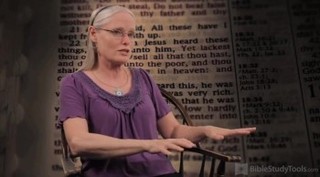
Change Translation
- Recent Translations
- All Translations
13
and he asked the wise men, which by the king's custom were ever with him, and he did all things by the counsel of them, that knew the law and the rights of greatest men; (and he asked his wise men about this, who by the king's custom were always with him, and he did everything after their counsel, for they knew the law and the rights of the people;)
Videos for Esther 1:13

Esther 1:13 Meaning and Commentary
Esther 1:13
FOOTNOTES:
F20 Thalia, sive, l. 3. c. 14, 31. so in Aelian. Var. Hist. l. 1. c. 34.
Then the king said to the wise men that knew the times
Astrologers, as Aben Ezra, that knew the fit time for doing anything; or that had knowledge of ancient times, historians, well read in history, and knew things that had happened similar to this:
for so was the king's manner towards all that knew law and judgment;
it was customary with him in any case of difficulty to have the opinion and advice of those that were expert in the law, and well understood right and wrong. These are called by Herodotus F20 the king's judges.
F20 Thalia, sive, l. 3. c. 14, 31. so in Aelian. Var. Hist. l. 1. c. 34.
Taken from John Gill's Exposition of the Bible
Unlock Deeper Insights: Get Over 20 Commentaries with Plus! Subscribe Now
Esther 1:13 In-Context
11
that they should bring in before the king the queen Vashti, with a diadem set upon her head, to show her fairness to all the peoples and princes; for she was full fair. (that they should bring in Queen Vashti before him, with a crown put on her head, to show off her beauty to all the peoples and the princes, or the leaders; for she was very beautiful indeed.)
12
And she forsook, and despised to come at the commandment of the king, which he had sent (to her) by the honest and chaste servants (But she refused to come at the king's command, which he had sent to her by the eunuchs). Wherefore the king was angry, and kindled with full great vengeance;
13
and he asked the wise men, which by the king's custom were ever with him, and he did all things by the counsel of them, that knew the law and the rights of greatest men; (and he asked his wise men about this, who by the king's custom were always with him, and he did everything after their counsel, for they knew the law and the rights of the people;)
14
forsooth the first and the next were Carshena, and Shethar, Admatha, and Tarshish, and Meres, and Marsena, and Memucan, seven dukes of Persia and of Media, that saw the face of the king, and were wont to sit the first after him; (and the first and the second were Carshena, and Shethar, and then Admatha, Tarshish, Meres, Marsena, and Memucan, seven princes, or leaders, from Persia and Media, who were always with the king, and were the first to sit after him;)
15
the king asked them, to what sentence the queen Vashti should be subject, that would not do the commandment of king Ahasuerus, which he had sent (to her) by the honest and chaste servants. (and the king asked them, What sentence should Queen Vashti be subject to, for she would not obey the command of King Ahasuerus, which he sent to her by the eunuchs.)
Copyright © 2001 by Terence P. Noble. For personal use only.